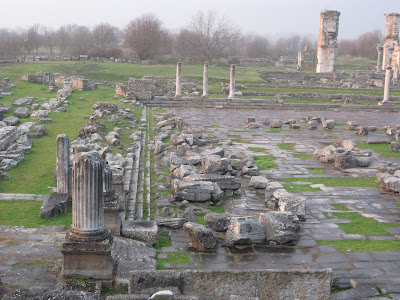Self-Willed Abasement

Basilica San Marco, Venice. It wasn't until years after Paul wrote to Philippi that the Church would adorn her buildings with crosses. Scripture Phil. 2:7b And being found in human form, 8 he humbled himself and became obedient to the point of death— even death on a cross. Observation To try to put into words what this passage means for us seems futile. The mystery of what Christ has done for us is almost incomprehensible, and that may be why it’s so hard for many to accept. What Jesus did for us was intentional, an act of his own will that led to his abasement. Jesus serves as a pattern for the moral life of the Philippians because “his humility is self-willed.” (Flemming, NBBC) Jesus chooses to humble himself, becoming like a servant. The death that he experienced, his execution, was that of a servant or slave. “In fact, it was so common for slaves to be crucified in the Roman wor...







